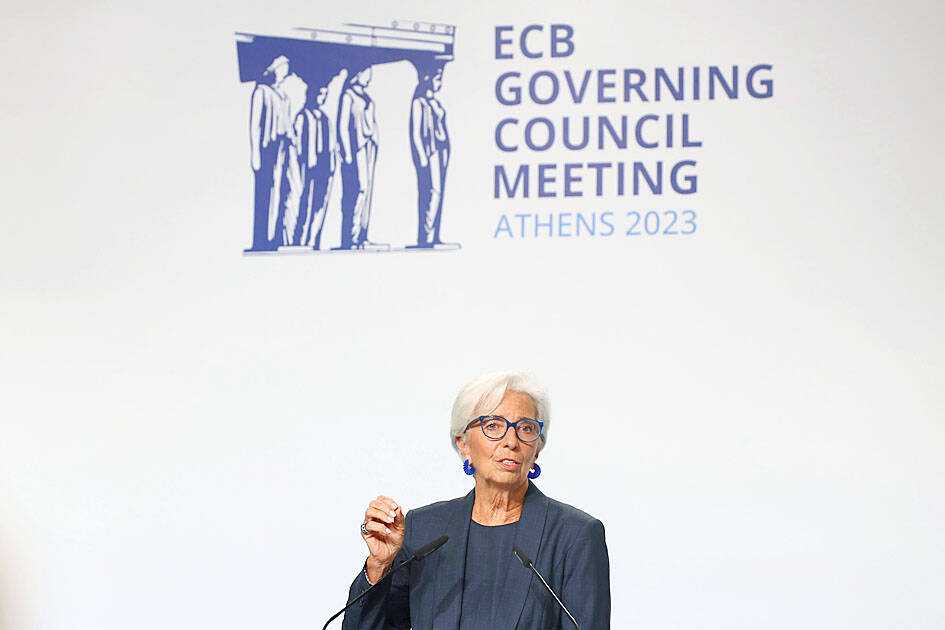The European Central Bank (ECB) left interest rates unchanged for the first time in more than a year as it gauges whether an unprecedented series of hikes will succeed in subduing inflation.
Following last month’s knife-edge decision to lift the deposit rate to a record 4 percent, policymakers kept it there yesterday — matching the predictions of all economists surveyed by Bloomberg.
They reiterated in a statement that holding borrowing costs at that level for long enough will make a “substantial contribution” to bringing consumer price gains back to the 2 percent target.

Photo: Bloomberg
Speaking in Athens, where the Governing Council gathered for one of its regular meetings beyond the ECB’s Frankfurt headquarters, President Christine Lagarde said “we have to be steady.”
“Having a discussion on cuts is totally, totally premature,” she told reporters, reiterating her position from last month’s meeting. “The fact that we are holding doesn’t mean to say that we will never hike again.”
The euro held losses against the US dollar, while German bonds edged higher. Italian bonds, which have been a major beneficiary of ECB debt-buying programs, outperformed as Lagarde said changes to the 1.7 trillion euro (US$1.8 trillion) pandemic-era Public Sector Purchase Program (PEPP) initiative weren’t discussed this week.
Like its peers in the US and the UK, the ECB hasn’t shut the door to further hikes, should inflation fail to ease quickly enough. But there is little doubt among economists and investors that the high point for eurozone borrowing costs has been reached following 10 back-to-back moves starting in July last year.
ECB officials aren’t offering many clues, with several focusing instead on other policy levers like PEPP. Tweaks there could prove controversial, though, as Middle East tensions threaten to push oil prices higher, Italy’s government finances worry investors and the euro area’s economy wobbles amid higher credit costs.
“As is often the case with monetary policy, there is this transmission lifetime,” Lagarde said. “The assessment by our staff is that there is still more in the pipeline, and more to come to affect the real economy. And the assumption is that it will continue to unfold throughout the end of 2023 and first quarter of 2024.”
The ECB’s announcement is part of a slew of global rate meetings. On Wednesday, the Bank of Canada kept rates unchanged for a second straight time, while leaving open the possibility of more tightening. Next week will feature decisions by the US Federal Reserve and the Bank of England. Both are expected to hold fire.
Lagarde warned that growth risks remain skewed to the downside.
“The economy is likely to remain weak for the rest of this year,” she said. “But as inflation falls, further household real incomes recover and the demand for euro-area exports picks up, the economy should strengthen over the coming years.”

Taiwan Semiconductor Manufacturing Co (TSMC, 台積電) would not produce its most advanced technologies in the US next year, Minister of Economic Affairs J.W. Kuo (郭智輝) said yesterday. Kuo made the comment during an appearance at the legislature, hours after the chipmaker announced that it would invest an additional US$100 billion to expand its manufacturing operations in the US. Asked by Taiwan People’s Party Legislator-at-large Chang Chi-kai (張啟楷) if TSMC would allow its most advanced technologies, the yet-to-be-released 2-nanometer and 1.6-nanometer processes, to go to the US in the near term, Kuo denied it. TSMC recently opened its first US factory, which produces 4-nanometer

PROTECTION: The investigation, which takes aim at exporters such as Canada, Germany and Brazil, came days after Trump unveiled tariff hikes on steel and aluminum products US President Donald Trump on Saturday ordered a probe into potential tariffs on lumber imports — a move threatening to stoke trade tensions — while also pushing for a domestic supply boost. Trump signed an executive order instructing US Secretary of Commerce Howard Lutnick to begin an investigation “to determine the effects on the national security of imports of timber, lumber and their derivative products.” The study might result in new tariffs being imposed, which would pile on top of existing levies. The investigation takes aim at exporters like Canada, Germany and Brazil, with White House officials earlier accusing these economies of

GREAT SUCCESS: Republican Senator Todd Young expressed surprise at Trump’s comments and said he expects the administration to keep the program running US lawmakers who helped secure billions of dollars in subsidies for domestic semiconductor manufacturing rejected US President Donald Trump’s call to revoke the 2022 CHIPS and Science Act, signaling that any repeal effort in the US Congress would fall short. US Senate Minority Leader Chuck Schumer, who negotiated the law, on Wednesday said that Trump’s demand would fail, while a top Republican proponent, US Senator Todd Young, expressed surprise at the president’s comments and said he expects the administration to keep the program running. The CHIPS Act is “essential for America leading the world in tech, leading the world in AI [artificial

REACTIONS: While most analysts were positive about TSMC’s investment, one said the US expansion could disrupt the company’s supply-demand balance Taiwan Semiconductor Manufacturing Co’s (TSMC, 台積電) new US$100 billion investment in the US would exert a positive effect on the chipmaker’s revenue in the medium term on the back of booming artificial intelligence (AI) chip demand from US chip designers, an International Data Corp (IDC) analyst said yesterday. “This is good for TSMC in terms of business expansion, as its major clients for advanced chips are US chip designers,” IDC senior semiconductor research manager Galen Zeng (曾冠瑋) said by telephone yesterday. “Besides, those US companies all consider supply chain resilience a business imperative,” Zeng said. That meant local supply would